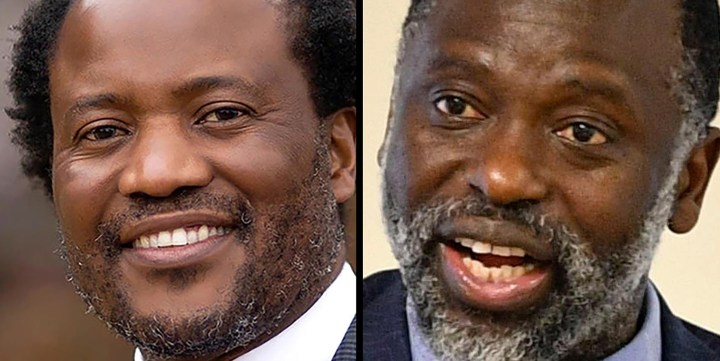ACADEMIC PROFILES
Meet two pioneering South African university Vice-Chancellors blazing the global science trail

Professor Zeblon Vilakazi has been inducted as a Fellow of the Royal Society and Professor Tshilidzi Marwala will take up the position of rector of the United Nations University in Tokyo.
Two of South Africa’s top academics have received international recognition for their work. Zeblon Vilakazi, vice-chancellor of the University of the Witwatersrand, was inducted as a Fellow of the Royal Society, and the vice-chancellor of the University of Johannesburg (UJ), Tshilidzi Marwala, has been appointed to the United Nations University (UNU) in Tokyo.
Tshilidzi Marwala
Marwala’s journey in engineering started in Venda, where he comes from, and where he “grew up surrounded by great people”.
These great people include his mother, who made “traditional engineering products” such as mats and gadgets, said Marwala. Another influential person in his life was his late father, who was a maths teacher.
When Marwala had to decide what to study at university, he went with mechanical engineering. “I initially wanted to do electrical engineering but I saw that my friend had filled in mechanical engineering on his form and I thought that sounded cooler,” he said.
Marwala would go on to do his undergraduate degree in mechanical engineering at Case Western Reserve University in the US. He followed this with a PhD in artificial intelligence (AI) and engineering at the University of Cambridge.
“I was interested in doing AI because it sounded interesting. I did it 25 years ago and at that time nobody even knew what it was,” said Marwala.
Marwala is a registered professional engineer, a Fellow of the World Academy of Sciences, the Academy of Science of South Africa, the African Academy of Sciences and the South African Academy of Engineering.
Read more in Daily Maverick: “African scientists and technology could drive future black hole discoveries”
When he found out that he had been chosen for the UN post he was in Italy. “Stanford University had organised a symposium on AI practice theory. I was at a restaurant in Bellagio when I realised I had a missed call from the deputy secretary-general of the UN. I rushed to the hotel and waited for them to call again,” said Marwala.
He was visibly excited when he spoke about the UNU. “The UNU is an important organisation because it is about tackling global issues. It’s beyond individual national interests,” explained Marwala.
The UNU is a global think-tank with 13 institutes in 12 countries. Through collaborative research and education, it supports efforts to resolve the pressing global challenges of human development and welfare that affect the UN and its member states.
About his appointment, Marwala said: “I want to serve the world and be part of tackling some of the big global issues such as gender equality, hunger, energy security and sustainable cities.”
Leaving UJ
Marwala starts his position as the rector of UNU on 1 March 2023. With a smile that lit up the room, he said: “I can’t wait to start. I am energised and I think we’re going to do fantastic work.”
UJ’s chair of council, Mike Teke, said in a statement that the council was proud “that one of our own has attained such an honour”.
“[Marwala] will stay on at UJ for the next eight months to ensure that there is a smooth transition as we undertake the processes to identify his successor. UJ will continue to function as normal under the leadership of Prof Marwala until this process is completed,” said Teke.
Marwala believes the legacy he leaves behind at UJ is of a “richer university – both financially and academically”.
UJ is ranked second in Africa after the University of Cape Town, which is first on the continent, according to the QS World University Rankings.
Zeblon Vilakazi
In the 1980s “the options available for black people were to become a doctor or a teacher, but for me, when I heard about Neil Armstrong [landing on the moon], whenever I looked up at the moon it opened up my imagination”, said renowned nuclear physicist Vilakazi, who hails from Katlehong in Ekurhuleni.
“When I got older, someone suggested I do engineering or science. I liked Einstein so I decided to become a physicist,” he said with a smile.
Read more in Daily Maverick: “Finding African solutions to African problems – we must reframe science innovation”
Vilakazi obtained his PhD in nuclear physics in 1998. He was instrumental in establishing South Africa’s first experimental high-energy physics research group.
Before he was inducted as a Fellow of the Royal Society, he was told of his nomination in September 2021. Fellows do not apply to be inducted; they have to be nominated by current fellows.
“When I got the email, I was not sure they were talking to the right person.
“I responded and said that for the past few years I have not been doing as much research, I have been involved in management, and they responded and said they knew that and that they were looking at my work history and what I’d done in the field,” said Vilakazi.
Before he sent his CV to the Royal Society, he’d asked a good friend to take a look at it. When he got the good news about his induction, Vilakazi thought: “That must mean I’m good at writing CVs.”
Read more in Daily Maverick: “Tulio de Oliveira – Scientists in Africa should be recognised, not punished, for scientific discovery”
The Royal Society is a self-governing fellowship made up of the most eminent scientists, engineers and technologists from the UK and the Commonwealth. Fellows and foreign members are elected for life through a peer review process on the basis of excellence in science.
There are about 1,700 fellows and foreign members, including about 85 Nobel laureates. Each year up to 52 Fellows and up to 10 foreign members are elected from a group of about 800 candidates who are proposed by the existing fellowship.
Other South Africans who are fellows of the Royal Society include Salim Abdool Karim, who was chairperson of the Ministerial Advisory Committee on Covid-19.
‘Being nominated was a victory’
Vilakazi said that it usually took a minimum of seven years before someone was inducted into the Royal Society.
“I got in the first time, which is pretty unusual. However, for me, being nominated was a victory,” he said.
Read more in Daily Maverick: “Meeting the enemy face-to-face: The intrepid scientist who grew Omicron for testing”
When he received the news in May that he would be inducted in July, he said he kept pinching himself.
Vilakazi, who is modest when he talks about his achievements, said the induction was not just an achievement for him, but also an achievement for the broader South African science community.
“Hopefully it will inspire others who look like me and raise awareness about the good work that scientists are doing in this part of the world,” he said. DM168
Top 10 universities in Africa
- University of Cape Town;
- University of Johannesburg;
- The American University in Cairo, Egypt;
- University of the Witwatersrand, Johannesburg;
- Stellenbosch University;
- Cairo University, Giza, Egypt;
- University of Pretoria;
- Université de Sousse, Sousse, Tunisia;
- Ain Shams University, Cairo;
- Rhodes University, Makhanda.
Source: QS World University Rankings 2022
This story first appeared in our weekly Daily Maverick 168 newspaper, which is available countrywide for R25.






















 Become an Insider
Become an Insider
Be still my beating heart. So proudly South African!!!
Absolutely awesome. Heartfelt congratulations to both Professors. Shining lights of South African achievement. Well done.